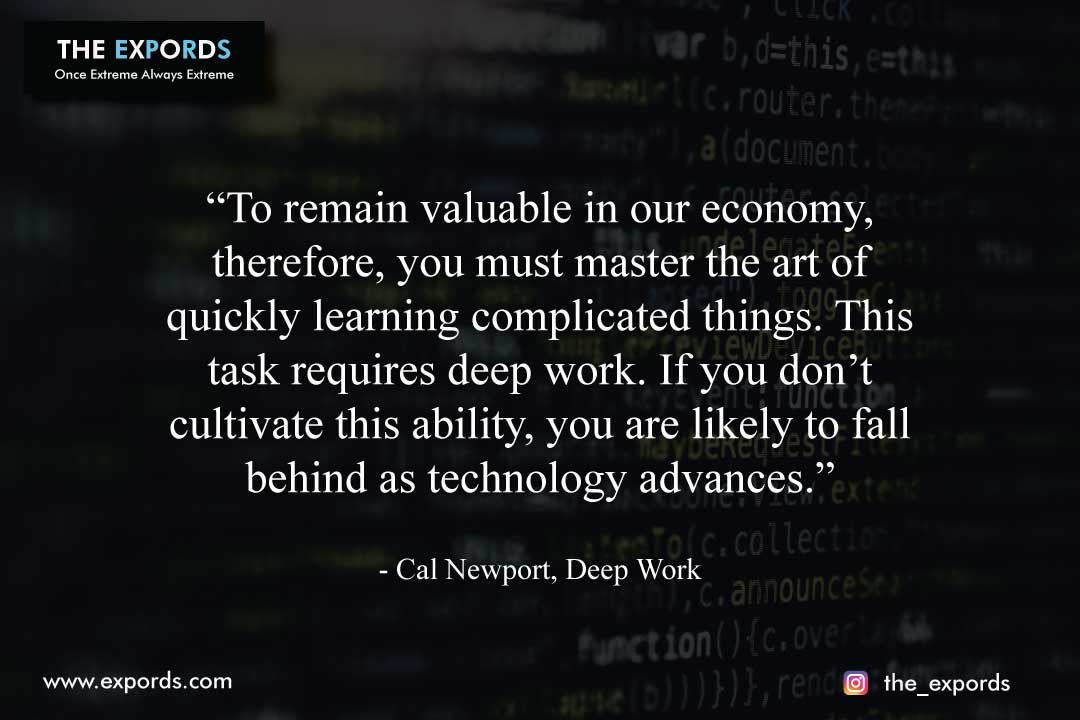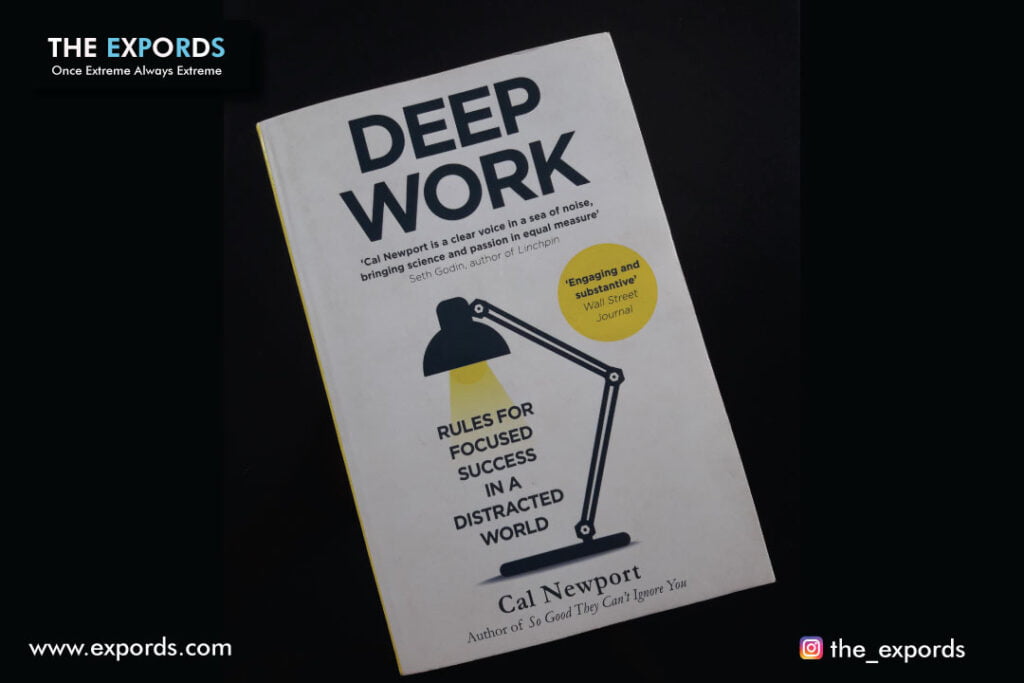This post may contain affiliate links. If you buy a product through those links, I may earn a small commission at no extra cost to you.
Get this book: Paperback
Title: Deep Work- Book Review
Book: Deep Work: Rules for Focused Success in a Distracted World
Author: Cal Newport
Publisher: Piatkus
Pages: 296 (Paperback)
First Published: 2016
I finished reading Deep Work: Rules for Focused Success in a Distracted World. And I must admit that this is one of the best books on productivity and developing focus. In this article, I would share everything about the book Deep Work– information about the author, the book Deep Work, what I have learned from the book, what I liked and didn’t like about it, whether it is worth reading and who should read it. So, let’s begin from the author-
About the author
Cal Newport, born in 1982, is an American non-fiction author who is well-known for his books- Deep Work: Rules For Focused Success in a Distracted World, So Good They Can’t Ignore You: Why Skills Trump Passion in The Quest For Work You Love, and Digital Minimalism: Choosing a Focused Life in a Noisy World.
Cal Newport received a Ph.D. in computer science from the Massachusetts Institute of Technology in 2009 and is an associate professor of computer science at Georgetown University.
What is the book Deep Work about?
Deep Work is a book on the science of productivity. The author says that you must work deeply- with uninterrupted and high concentration- to succeed in this global economy. This book differentiates deep work from shallow work and tells us to spend more time with the former.
The book begins with an introduction, where the author explains the concept of deep work and shallow work with some real-life examples. The first part of the book establishes the idea in three chapters. The first chapter explains what we can do to thrive in this new economy and how deep work can help us in this pursuit. In the second chapter, the author gives examples of corporate companies who don’t respect deep work explaining that deep work is rare. The third chapter describes why deep work is meaningful by giving neurological, philosophical, and psychological arguments.
In the second part of the book, the author lists some rules that can help us develop deep work habits. The second part consists of four chapters. The first chapter contains four methods of deep work, which we can choose according to our convenience. This chapter also explains the 4Dx principles, which the author says can help us in working deeply. The second chapter tells us that the importance of boredom and assures us that it is okay to get bored. The third chapter argues why we should quit social media. And the final chapter assists us in reducing the time we spend in shallow works. The book ends with a conclusion that contains few examples of great personalities who did deep work to achieve remarkable results.
What have I learned from Deep Work?
Following are three key lessons that I have learned from the book Deep Work-
1. Develop deep work habits
Our productivity is directly proportional to the intensity of focus and the time we spend at work. Here time is limited as we all have 24 hours in a day. But, the intensity of focus has no limit. A person with high intensity of focus can get more than a person with low intensity of focus spending the same amount of time. A work done with high intensity of focus is simply deep work.
So cognitively demanding tasks such as solving a complex math problem, writing a story, writing a computer program, etc., when done with very high concentration, is deep work. On the contrary, shallow work includes all the tasks that can be done with low concentration and hence doesn’t produce much value. These types of activities can be easily replicated. Checking emails, scrolling Instagram or Facebook, watching movies or web series, etc., are all shallow work.
Deep work increases our productivity, helps us get more done in less time, helps us get extraordinary results, and also allows us to achieve satisfaction with our work. At the same time, shallow work doesn’t help us create anything valuable and is an excellent way to waste our time. Hence the first lesson I learned is to spend time doing deep work and avoiding shallow works.
Expords is on YouTube with amazing videos…

2. Your attention is limited
When I was preparing for my engineering entrance exams, I worked very hard, attended classes, and practiced solving Mathematics, Physics, and Chemistry problems. But still, I wasn’t satisfied with my Work. I always felt tired, even in the morning, and wasn’t able to focus properly. This continued, and I couldn’t find any solution because I didn’t look for any, thinking hard work is all I need.
But after four years, after reading Deep Work, I realized what mistake I was making at that time. I was using all of my limited attention every day, and hence my intensity of focus was always low. This made me less productive and not satisfied with my work instead of all those hard works.
According to Attention Restoration Theory (ART), to concentrate on any work requires directed attention. And directed attention is limited. So, once it gets finished, you would struggle to concentrate.
I learned from the book that to preserve the directed attention, shut down everything when the workday is finished until the next day . Don’t try to get a little more by working at night. If you work at night, you will use all your directed attention and won’t focus properly the next day. The overall result will be that you will get less work done than having a shutdown, and working will full attention the next day.
Hence, Downtime from work is very helpful in increasing your productivity. While shut down, you may spend time with your family, meditate, exercise, or spend time with nature. All of these will help you to recharge your limited directed attention for the next day. This is one of the most powerful lessons from the book Deep Work.
3. It is okay to get bored
Whenever we face boredom, we all have a habit of checking our phones. We may open Instagram and check the likes and follows; we then scroll through our feed and get lost in it. Whenever we are bored- maybe in a lecture, zoom meeting, standing in a queue, or even at the washroom- we check our phone. This programs our brain to check our phone at the slightest hint of boredom. We start craving for distraction and end up spending hours on social media.
Every time we allow ourselves to get distracted, our brain becomes weak at handling distraction. The solution is to embrace boredom. Feeling bored is not a sin. Whenever you feel bored, let it be. Don’t give in to your distractions, and your brain muscles will be strong at handling them and hence at deep work. Long story short: the more we handle the distraction without giving in, the better we will get at handling distractions; the more we give in to the distractions, the weaker we will be handling them.
What did I like about Deep Work?
The book contains many examples of people like Carl Jung, Bill Gates, JK Rowling, and many others we may not have heard about. These examples helped me to understand the power of deep work fully and build trust in the author. No doubt, the author had to research a lot before writing the book.
I liked the concept of deep work and its importance in this modern world. The book contains practical rules for building deep work habits, which are simple but effective. Since I had suffered a lot doing shallow Work, I felt an unusual sense of freedom when I got to know about the ways through which I can achieve it. The book has simple language which anyone can understand, even a beginner self-help reader.
What didn’t I like about Deep Work?
The only thing which I didn’t like is that the book is somewhat repetitive. The author keeps on emphasizing the importance of deep work; although it was valuable, it would have been better if it was more concentrated. I was more interested in how I can achieve deep work rather than the importance of deep work.
Is Deep Work worth reading?
Deep Work could help you build one of the most valuable habits for thriving in this economy- the habit of working with great intensity of focus. The book has listed methods of deep work which would inspire you chose one for you to get indulged in creating something extraordinary. It has inspiring examples and case studies that would easily make you understand the importance of deep work. It would make you realize whether the time you spend on social media is worth it or not. That said, it will make you realize that a life spent on doing deep work is the best way to live- physically, mentally, spiritually, and financially. The book Deep Work is completely worth reading.
Who should read Deep Work?
The book would be best for all those who feel that they are not productive and waste a lot of time on social media, who are not satisfied with their work and want to spend their lives doing valuable things. Whether you are an employee doing a 9-5 job, an entrepreneur, or an artist- Deep Work has practical ways that will increase your productivity and make your life meaningful. Since success is all about concentrated work, I would recommend this book to everyone who wants to succeed in this distracted world.


Good to know, I learnt about how to recharge the mental energy required for success in life.
It is pleasing to know.. thank you!
Nice summary and very helpful indeed
Thanks a lot, Sudhanshu.
Getting the summary of such highly effective books is really helpful, specially during busy hours of the day…Great Work Man!
Thanks a lot, bro!!!
Pingback: IKIGAI: The Japanese Secret to a Long and Happy Life- Summary - Expords
Pingback: What is Parkinson's law? -Examples and Use - Expords
Pingback: 7 Encouraging Benefits of Waking Up Early - Expords
Pingback: 7 Powerful Habits of Extremely Successful People - Expords
Pingback: Eat That Frog: 3 Powerful Lessons - Expords